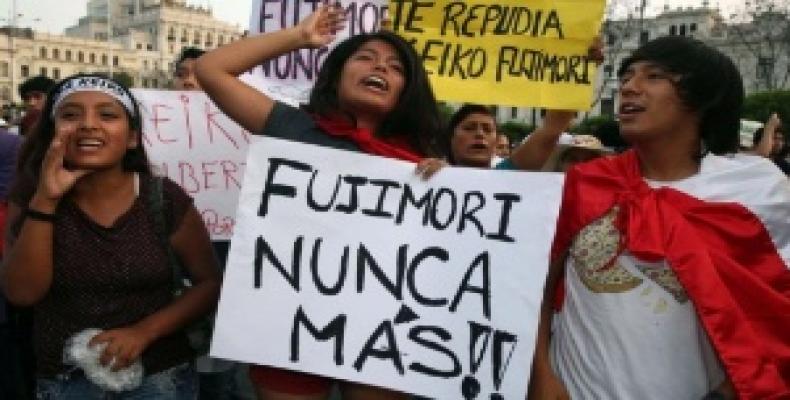Lima, December 7 (RHC)-- Peru’s jailed former dictator Alberto Fujimori said that authorities had moved him from his prison cell to a health facility in the capital city Lima to undergo medical testing related to a brain condition and mobility problems.
On his Twitter account, Fujimori wrote that he had been moved to a clinic for two reasons. First, he reported that he would be tested for brain ischemia, a condition involving a lack of blood flow to the brain which can increase the risk of suffering a stroke. Second, he also said he has suffered “persistent limitations moving my right shoulder and hematomas (a buildup of blood outside the blood vessels) that extend toward my elbow."
The former strongman, whose presidency morphed into a dictatorship in the mid-1990s, opening the door for a slew of human rights abuses, has been serving a 25-year jail sentence since 2009 for human rights crimes and corruption offenses committed during his time in office from 1990 to 2000.
The trip to the Lima clinic is not the first time Fujimori, now 78 years old, has received medical treatment outside of prison since 2009. He has reportedly suffered various health issues, including depression and a growth on his tongue that his family claimed was cancerous. Supporters have used his deteriorating health as a pretext to try to secure a pardon for his crimes.
Fujimori’s fate was in the spotlight again earlier this year when his eldest daughter, Keiko Fujimori, was a front-runner in the presidential race, raising speculation that, if elected, she would quickly move to award amnesty to her father. Though long favored in the polls, Keiko lost the presidential runoff election to President Pedro Pablo Kuczynski, who has been more measured on the issue of Fujimori’s imprisonment.
Although Kuczynski has said he will not grant a pardon to the former strongman, he would sign off on a measure by Congress to allow Fujimori to complete his sentence on house arrest. Peru’s Congress is controlled by Fujimori’s Popular Force party, which won 72 of the 130 seats in April’s election.
A move to lighten Fujimori’s sentence by putting him on house arrest would likely spark widespread outrage from the movement that repeatedly waged mass protests against Keiko’s bid for president and her father’s brutal legacy during the election campaign. Fujimori’s 10-year rule oversaw multiple massacres, forced disappearances, a mass forced sterilization campaign targeting poor and Indigenous women and other human rights abuses.
Former President Ollanta Humala denied a request from Fujimori’s children to pardon him.
Peruvian Ex-Dictator Alberto Fujimori Leaves Jail for Medical Tests


